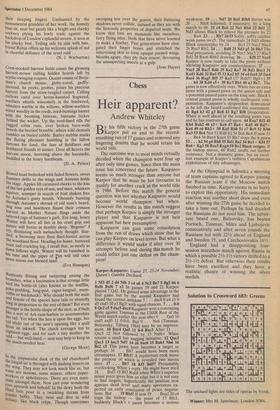Chess
Heir apparent?
Andrew Whiteley
By his fifth victory in the 27th game Karpov put an end to the record- smashing run of 17 games and removed any lingering doubts that he would retain his world title.
The outcome was to most minds virtually decided when the champion went four up after only nine games. Since then the main issue has concerned the future. Kasparov seems so much stronger than anyone but Karpov that he must be hot favourite to qualify for another crack at the world title in 1986. Before this match the general question was not whether Kasparov would become world champion but when. However the results in this match suggest that perhaps Karpov is simply the stronger player and that Kasparov is not heir apparent but heir presumptive.
Kasparov can gain some consolation from the run of draws which show that he can play Karpov on level terms. But what a difference it would make if after over 30 attempts before and during this match he could inflict just one defeat on the cham- pion!
Karpov-Kasparov: Game 27, 23-24 November; Queen's Gambit Declined.
1 Nf3 d5 2 d4 Nf6 3 c4 e6 4 Nc3 Be7 5 Bg5 h6 6 Bxf6 Bxf6 7 e3 In games 19 and 21 Karpov played 7 Qd2. He gained some advantage in the first game but by the second Kasparov had found the correct antidote 7 . . . dxc4 8 e4 c5 9 d5 exd5 10 e5 Bg5! with equal chances. 7 . . . 0-0 8 Qc2 c5 9 dxc5 dxc4 Kasparov won a convincing game against Timman in the USSR-Rest of the World match earlier this year after 9 . . . 0a5 10 exd5 exd5 11 0-0-0. But 9 . . . Nc6 (Timman- Belyaysky, Tilburg 1984) may be an improve- ment. 10 Bxc4 Qa5 11 0-0 Bxc3 After 11 . . . Qxc5 12 Ne4 followed by 13 Nxf6+ White retains a small but nagging initiative. 12 Qxc3 Qxc3 13 bxc3 Nd7 14 c6 bxc6 15 Rabl Nb6 16 Be2 c5 This pawn later becomes a target so perhaps 16 . Bb7 would have been more circumspect. 17 Rfcl! A mysterious rook move the purpose of which is revealed two moves later. 17 . . . Bb7 18 Kn Bd5? Presumably overlooking White's reply. He might have tried 18 . . Bxf3 19 Bf3 Rab8 when White's superior minor piece gives him an edge but it is not easy to find targets. Superficially the position now appears dead level and many spectators ex- pected an early conclusion of peace negotia- tions. But . . . 19 Rb5! If now 19 . . . Bxa2 20 c4 traps the bishop — the point of 17 Rfcl. Suddenly Black's c pawn becomes a serious weakness. 19 . . . Nd7 20 Ra5 RfbS Better was 20 . . . Rfc8 followed, if necessary, by a king march to d6. 21 c4 Bc6 22 Nel Rb4 23 Bdl 22 Nd3 allows Black to relieve the pressure by 22 . . . Ra4. 23 . . . Rb7 24 f3 Softly, softly catchee weak pawn on c5. The immediate 24 Nd3 allows Black counterplay by 24 . . . Be4 25 Nxc5 Nxc5 26 Rxc5 Rb2. 24 . . . Rd8 25 Nd3 g5 26 Bb3 The final precaution, avoiding 26 Nxc5 Nxc5 27 Rxc5 Rd2 28 Rxc6 Rbb2 drawing. 26 . . . Kf8 27 Nxc5 Karpov is now ready to take the pawn without allowing Kasparov any counterchances. 27 . . . Nxc5 28 Rxc5 Rd6 29 Ke2 Ke7 30 Rdl Rxcl 31 Kxd1 Kd6 32 Ra5 f5 33 Ke2 h5 34 e4 fxe4 35 fxe4 Bxe4 36 RxgS Bf5 37 Ke3 (37 Rxh5? Bg4+) 37 . . . h4 38 Kd4 e5+ 39 Kc3 Bbl 40 a3 Re7. The game is now effectively over. White has an extra pawn with a passed pawn on the queen side and a potential passed pawn on the king side. Black's central passed pawn is wholly inadequate com- pensation. Kasparov's despondent demeanour as he left the board confirmed this assessment. 41 Rg4 h3 42 g3 Re8 43 Rg7 Rf8 Desperation. White is well ahead in the resulting pawn race and he has reserves to call upon. 44 Rxa7 Rf2 45 KM Rxh2 46 c5+ Kc6 47 Ba4+ Kd5 48 Rd7+ KM 49 c6 Rb2+ 50 Ka5 Rb8 51 c7 RcS 52 Kb6 Ke3 53 Bc6 Not 53 Rd8 h2 54 Bc6 Be4 If now 53 . . . Be4 54 Bxe4 Kxe4 55 Rh7 stops the h pawn. 53 . . . h2 54 g4 RhS 55 Rdl Bat 56 Rel+ Kf4 57 Re4+ Kg3 58 RxeS Kxg4 59 Re2 Black resigns. If the bishop moves, 60 Rxh2 snuffs out further resistance. Not a dramatic game, but an excel- lent example of Karpov's ruthless Capablancan exploitation of tiny advantages.
At the Olympiad in Salonika a meeting of team captains agreed to Karpov joining the Russian team if the Moscow match finished in time. Karpov seems in no hurry to exploit this opportunity. His immediate reaction was another short draw and even after winning the 27th game he decided to take a time out. Perhaps he had decided the Russians do not need him. The substi- tute board one, Belyaysky, has beaten Portisch, Timman, Miles and Ljubojevic consecutively and after seven rounds the Russians led with 221/2 ahead of England and Sweden 19, and Czechoslovakia 181/2.
England had a disappointing four- session marathon match against Russia in which a possible 21/2-11/2 victory drifted to a 21/2-11/2 defeat. But otherwise their results have been excellent and they have a realistic chance of winning the silver medals.






















































 Previous page
Previous page